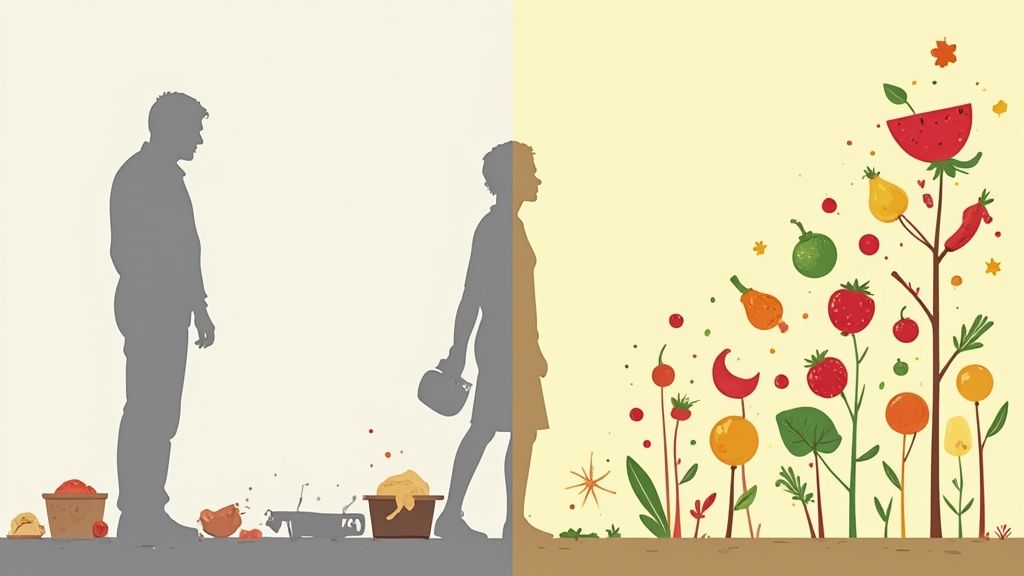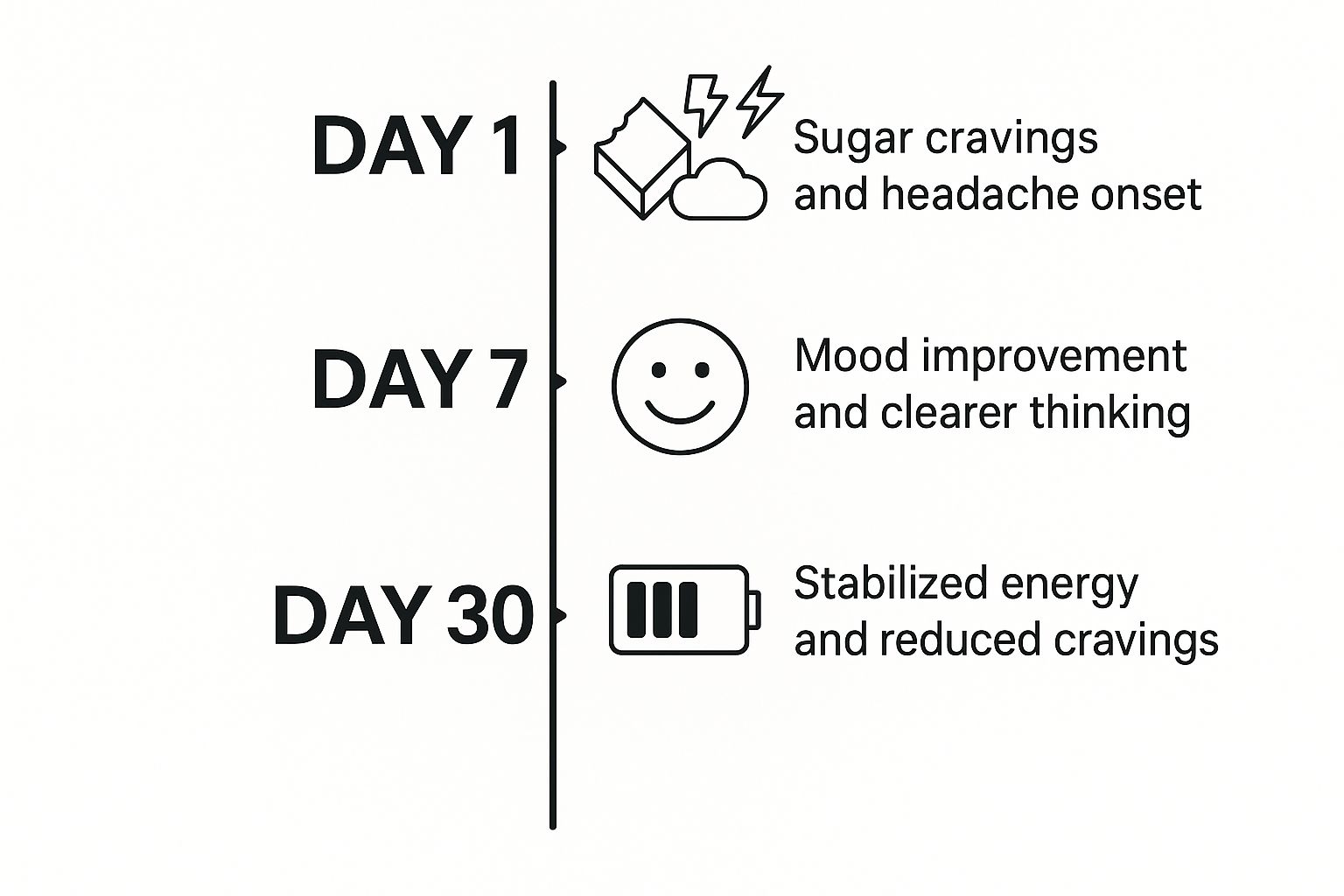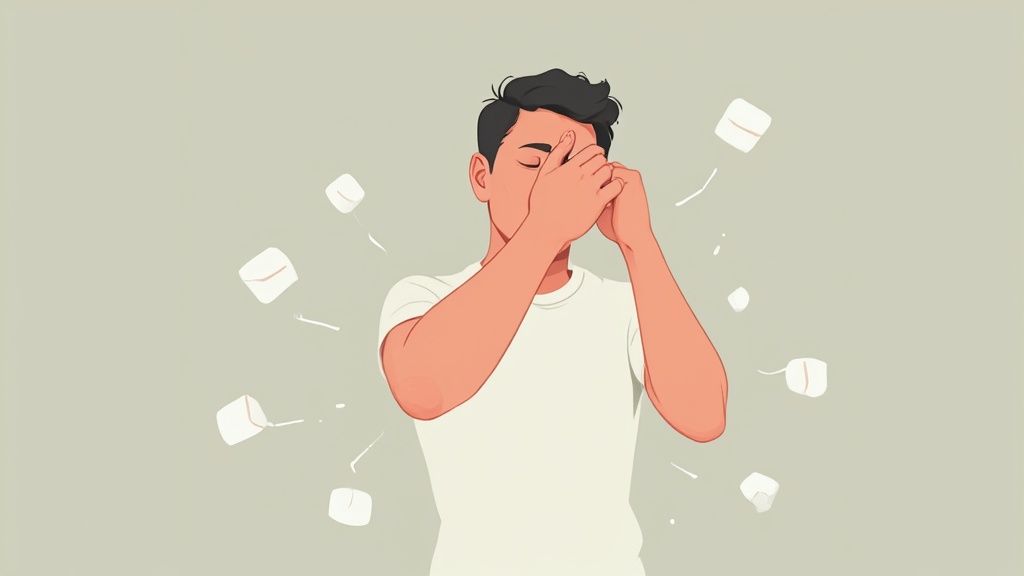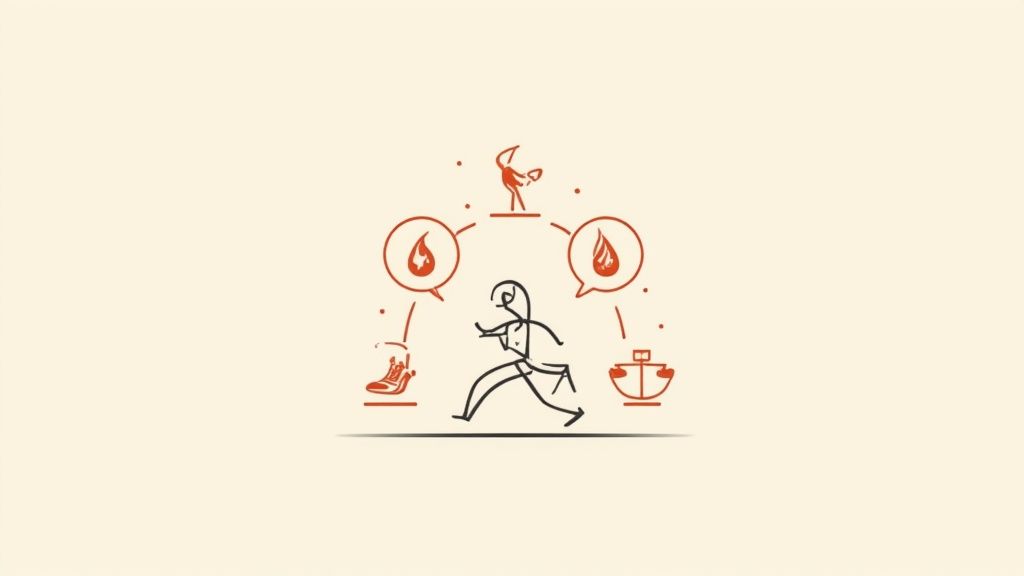What Happens When You Quit Sugar Your Body's Journey

When you first quit sugar, your body kicks off a major recalibration. The first few days are often the toughest, marked by withdrawal symptoms like headaches and intense cravings. But stick with it, because this initial hurdle is quickly followed by some incredible benefits, like stabilized energy levels, sharper mental clarity, and a healthier future.
Your Body’s Timeline for Quitting Sugar
Deciding to cut out added sugar is a game-changer for your health. Think of it as hitting the reset button on your entire system. At first, your body will probably put up a fight—it's used to getting quick, easy energy from all that sugar. This is the withdrawal phase, and it's a completely normal part of the process.
Push through that temporary discomfort, though, and you'll trigger a domino effect of positive changes. Those wild energy spikes and crashes will smooth out. Your mood becomes more balanced, and that persistent "brain fog" you might not even have noticed begins to clear, leaving you with a sharper focus.
The Journey from Withdrawal to Wellness
The changes aren't just on the inside. Many people report clearer skin, less bloating, and even a difference in how food tastes. As your palate resets, you'll start to notice the natural sweetness in whole foods like fruits and vegetables in a whole new way. This journey happens in distinct stages, each with its own set of challenges and rewards.
The most important thing to remember is that the initial struggle is temporary. It's a clear sign that your body is healing and rebalancing. The long-term benefits are more than worth the short-term difficulty of that first week.
To give you a clearer picture of what's ahead, let's break down the key milestones you can expect to hit.

As you can see, that early discomfort doesn't last long. It quickly makes way for real, noticeable improvements in how you feel, both physically and mentally. This guide will walk you through each step of the journey, giving you the insights you need to make it a success.
To make it even easier to follow, here’s a quick-glance table summarizing what you can expect day by day and week by week.
Timeline of What Happens When You Quit Sugar
| Timeframe | What to Expect (Physical Changes) | What to Expect (Mental Changes) |
|---|---|---|
| Days 1-3 | Headaches, fatigue, intense sugar cravings as your body adjusts. | Irritability, mood swings, anxiety, and brain fog are common. |
| Days 4-7 | Cravings start to lessen. Energy levels begin to stabilize. Less bloating. | Mental clarity improves, mood begins to stabilize. Focus sharpens. |
| Week 2 | Skin may start to look clearer. Energy is more consistent. | Mood is more stable. Fewer cravings mean less mental chatter about food. |
| Week 3-4 | Taste buds have reset—natural foods taste sweeter. Potential weight loss. | Sense of accomplishment and increased motivation. Better sleep patterns. |
| 1 Month+ | Reduced inflammation, lower risk for chronic diseases, sustained energy. | Overall improvement in mood and cognitive function. Food freedom. |
This timeline isn't set in stone—everyone's body is different. But it gives you a solid roadmap for the incredible transformation that happens when you finally break free from added sugar.
Surviving the First Week of Sugar Withdrawal
Let's be honest: the first few days after you quit sugar can be tough. Really tough. This is the sugar withdrawal phase, where your body and brain have to figure out what to do without the constant hit of simple carbs they've gotten used to.
Think of it like this: your body has been running on a very specific, easy-to-burn fuel. Now you've switched fuel types, and the engine needs a moment to recalibrate. It's a completely normal adjustment period, and knowing what's happening is half the battle.
What to Expect Physically and Mentally
So, what does this recalibration feel like? For most people, the first week brings on headaches, a deep sense of fatigue, and cravings that feel like they'll never end.
Your brain, which loved running on that cheap and easy glucose from sugar, is basically throwing a tantrum and demanding its fix. This can bubble up as irritability, frustrating brain fog, and some pretty wild mood swings.
Remember, these feelings are temporary signs that your body is healing. They are a normal part of the process and a clear indicator that you are breaking a powerful dependency. Pushing through this phase is key to unlocking the benefits on the other side.
The changes your body goes through when you stop eating sugar are surprisingly fast. While those initial withdrawal symptoms like headaches and tiredness can feel intense, they usually fade within a week. Once they do, you'll start to notice more stable, consistent energy. For a broader look at sugar's impact on global health and markets, you can explore some recent market and health reports.
Actionable Strategies to Manage Withdrawal
You don't just have to grit your teeth and suffer through it. There are simple, practical things you can do to make this first week much smoother and set yourself up to win in the long run. The idea is to give your body the support it needs while it adjusts.
Here are a few strategies that actually work:
- Stay Hydrated: Headaches are a classic sign of withdrawal, and being even a little dehydrated can make them ten times worse. Keep a water bottle handy and sip all day. It helps flush your system and can even help with fatigue.
- Prioritize Protein and Healthy Fats: When a craving strikes, your instinct might be to grab something sweet. Instead, reach for something packed with protein, fiber, and healthy fats. Think avocados, a handful of nuts, a hard-boiled egg, or some lean chicken. These foods keep your blood sugar stable, which is the secret to feeling full and taming those cravings.
- Get Gentle Movement: I know, you feel tired. But a little light exercise, even just a brisk walk around the block, can be a game-changer. It gets your endorphins flowing—your body's natural mood-lifters—and helps shake off that sluggish feeling that often comes with a sugar detox.
These symptoms can be a real challenge, but they are absolutely manageable. For a much deeper dive into everything you might experience, check out our guide on understanding sugar withdrawal symptoms. If you arm yourself with a plan and a few good strategies, you can get through this initial hump and start enjoying all the amazing benefits of living with less sugar.
Discovering Renewed Energy and Mental Clarity

After you get through the initial rough patch of withdrawal, you start to feel the real magic of quitting sugar. The biggest thing you'll probably notice is a complete change in your energy. Gone are the unpredictable, jittery spikes and crashes, replaced by a smooth, steady stream of vitality that lasts all day.
Think of your body's fuel source like a campfire. Sugar is the kindling—it flares up bright and hot, but it's gone in a flash, leaving you scrambling for more. Proteins and healthy fats, on the other hand, are like solid logs. They provide slow, consistent heat for hours. That’s the feeling you get used to.
This newfound stable energy has a massive impact on your brain. Without the constant up-and-down of blood sugar levels, the brain fog you might not have even realized was there finally starts to lift. You'll find yourself able to focus better, think more clearly, and your mood will be much more predictable.
The Ripple Effect of Stable Blood Sugar
The great news doesn't stop there. Most people find that the benefits start to ripple out across their entire body, giving them even more motivation to keep going.
You might start to notice other welcome changes, such as:
- Better Sleep Quality: When your blood sugar is stable, it helps regulate the hormones that control your sleep-wake cycle. The result? Deeper, more restorative sleep.
- Clearer Skin: A high-sugar diet often fuels inflammation, which can show up as acne and other skin issues. Cutting it out often leads to a calmer, clearer complexion.
- Reduced Bloating: Sugar can feed the less-than-friendly bacteria in your gut. When you remove it, your digestive system can find a healthier equilibrium, which usually means less bloating and discomfort.
One of the most amazing and unexpected perks is how your taste buds completely reset. Suddenly, foods you might have found boring, like a fresh strawberry or a bell pepper, will taste incredibly sweet and vibrant. It's like discovering a whole new world of flavor in real, whole foods.
As you start enjoying this clear-headed feeling, you might want to take it even further. You can boost your productivity and focus with techniques like the Pomodoro Method.
This is the stage where the "why" behind your decision becomes crystal clear. The positive changes you feel every single day make it so much easier to stick with it. You’re not just avoiding something anymore; you're actively choosing to feel fantastic.
The Long-Term Health Benefits of a Sugar-Free Life

The first few weeks after you ditch sugar can feel amazing—your energy stabilizes, the brain fog lifts, and you start to feel more in control. But the real magic, the deep, lasting transformation, happens over the long haul.
Think of it this way: committing to a low-sugar life isn't a quick fix. It's one of the best investments you can make in your future self, with health benefits that quietly build on each other month after month. This is about building a body that's not just healthier today, but more resilient for whatever comes tomorrow.
A huge part of this long-term shift happens deep inside, at a cellular level, and it all starts with your metabolic health. A diet loaded with added sugar is like constantly poking your pancreas, forcing it to churn out insulin. Over time, your cells can start to ignore this constant signal, leading to insulin resistance—the stepping stone to type 2 diabetes. When you take away that relentless sugary pressure, you give your body the breathing room it needs to reset and restore its insulin sensitivity.
Reducing Your Risk for Chronic Diseases
This reset has a powerful ripple effect across your entire body, dramatically lowering your risk for a whole host of chronic diseases. Excess sugar is a major source of chronic inflammation, that low-grade fire that contributes to so many long-term health issues. Cut the sugar, and you help put out that fire.
Your heart will thank you for it, too. Ditching sugar has been shown time and again to improve key markers of cardiovascular health. You're likely to see:
- Lower blood pressure as your blood vessels finally get a chance to relax.
- Reduced triglycerides, which are fats in your blood that are closely linked to heart disease.
- Improved cholesterol levels, helping you achieve a healthier balance.
Think of sugar as a constant, low-grade stressor on your entire system. When you remove it, your body can stop putting all its energy into crisis management and start focusing on optimal function. The result is more vitality and a stronger defense against illness.
Let's look at the data. A major study revealed that cutting sugar intake by just 10% was linked to a 12% lower risk of dying from heart disease. This isn't a coincidence; it's a direct result of those positive changes in blood pressure, cholesterol, and inflammation.
For a clearer picture, here's a breakdown of how key health markers can improve over the long term.
Long-Term Health Improvements After Quitting Sugar
This table highlights the significant, data-backed improvements you can expect to see in your health markers months after making a commitment to reduce your sugar intake.
| Health Marker | Typical Improvement | Associated Benefit |
|---|---|---|
| Fasting Blood Glucose | 10-15% reduction | Lowered risk of prediabetes and type 2 diabetes |
| Triglyceride Levels | 20-30% reduction | Improved heart health and reduced cardiovascular risk |
| Blood Pressure | 4-6 point drop in systolic/diastolic | Reduced strain on arteries and a healthier heart |
| Liver Fat | Up to 30% reduction | Lowered risk of non-alcoholic fatty liver disease (NAFLD) |
| Chronic Inflammation (CRP) | 20-40% reduction | Reduced systemic stress and lower risk of chronic diseases |
These numbers aren't just statistics; they represent a fundamental shift toward a healthier, more resilient body. Each one is a testament to the profound impact that reducing sugar can have on your long-term well-being.
Enhancing Overall Well-Being
Beyond just preventing disease, living with less sugar simply makes daily life better. Stable blood sugar helps regulate your hormones, which impacts everything from your mood to how well you sleep. This becomes especially important as we get older and our bodies navigate new phases.
Many people find they sleep much more deeply and wake up feeling genuinely refreshed once sugar is out of the picture. The benefits also extend to better hormonal balance, which can be a game-changer for sleep quality. For those looking for more support in this area, you can explore some great strategies for improving sleep during menopause.
Ultimately, the lasting impact of quitting sugar is a story of prevention and vitality. It's about giving your body the best possible chance to thrive for decades to come. To learn more, check out our complete guide to the benefits of quitting sugar.
A Look at Our Global Sweet Tooth
Before we dive into what happens to your body when you quit sugar, let's zoom out for a second. It helps to understand just how we got here. Your personal struggle with sugar isn't happening in a vacuum; it’s part of a much bigger global story.
For decades, sugar has sneakily worked its way into almost every corner of the modern food supply. This wasn't an accident. Thanks to economics and farming policies, refined sugar became incredibly cheap and easy to produce. Suddenly, it was everywhere—in bread, salad dressing, yogurt, and even pasta sauce.
This has created a food environment where eating a lot of sugar is the norm, not the exception. Knowing this isn't meant to discourage you. In fact, it's empowering. It means your decision to quit is a conscious, powerful choice to swim against a very strong current.
Just How Much Sugar Are We Talking About?
The amount of sugar being produced worldwide is mind-boggling, and it gives you a sense of the demand that has shaped our health and our waistlines. Between 2015 and 2024, global sugar production jumped from around 164.7 million metric tons to a staggering 177 million metric tons each year. This isn't just a number; it's a clear sign of how deeply sugar is woven into what we eat. You can dig deeper into these agricultural outlooks and trends if you're curious.
But there’s a change in the air. As more people learn about the health consequences, the pushback is getting stronger. We’re seeing governments introduce sugar taxes and more consumers actively looking for better options.
We're in the middle of a major cultural shift. Sugar is no longer seen as just a harmless treat. People are starting to understand its real impact on long-term health, and that's sparking a collective desire to do things differently.
What's really interesting is that new things are starting to shape these trends. In some countries, for example, new weight-loss drugs are expected to reduce sugar consumption by changing people's appetites and even how they taste sweet things.
Making Your Way Through the Modern Food Maze
When you see the big picture, it’s easier to understand why kicking the sugar habit feels like such an uphill battle. You’re trying to navigate a system that’s practically designed to keep you hooked. Every time you check a label and reach for the unsweetened version, you're doing something truly rebellious.
Here’s what all this global context means for you on a personal level:
- Hidden sugars are everywhere. Since it's a cheap way to add flavor and bulk, companies put it in countless processed foods you’d never suspect.
- Your cravings have been trained. Constant exposure from a very young age has conditioned our brains to want more.
- Your choice is a big deal. By opting out, you’re not just taking back your health—you’re sending a message that you want better food choices available.
Think of your journey as one small but important part of a much larger movement. When you understand the forces you're up against, you can be better prepared for the ride and feel even more proud of your decision to build a healthier life.
Practical Strategies for Quitting Sugar Successfully
Knowing what to expect when you quit sugar is one thing, but actually doing it requires a smart approach. This isn't about white-knuckling it through cravings. It's about setting up your life so that making the healthier choice is the easier choice.
Think of it as outsmarting your old habits, not just fighting them. Your first mission? Become a sugar detective. You'd be shocked to learn that added sugars are hiding in over 70% of packaged foods here in the U.S., often disguised under names like dextrose, high-fructose corn syrup, or cane juice. Getting comfortable reading nutrition labels is your single most important skill.

Building a Sugar-Free Foundation
Once you know how to spot the enemy, it's time to build your defense. The best way to beat cravings is to prevent them from ever showing up. Make sure every meal is built around protein, healthy fats, and fiber. This combination is the key to stable blood sugar, which in turn keeps you feeling full and satisfied for hours.
You don't have to overhaul your entire diet overnight. Small, simple swaps can make a world of difference:
- Swap sugary yogurt for plain Greek yogurt and top it with a handful of fresh berries.
- Switch your morning cereal for oatmeal or a couple of eggs with avocado.
- Replace soda and juice with sparkling water and a squeeze of lemon or a few mint leaves.
The goal here is progress, not perfection. Every little choice you make builds momentum, slowly rewiring your brain and taste buds for success down the road.
Social events can feel like a minefield, but a little prep work helps. Heading to a party? Have a protein-rich snack before you go so you’re not arriving starving. When you're eating out, stick to simple grilled or baked dishes and don't be afraid to ask for sauces on the side. For a more detailed walkthrough, check out our complete guide on a sugar detox for beginners at https://stopsugar.app/blog/sugar-detox-for-beginners.
At the end of the day, breaking up with sugar is a lifestyle shift built on new routines. If you want to dive deeper into the psychology of habit formation, these powerful behavioral change strategies offer some fantastic insights.
Answering Your Questions About Quitting Sugar
Even with a roadmap of what to expect, you've probably still got a few questions bouncing around in your head. Let's dig into some of the most common ones I hear—clearing these up will help you feel much more confident as you get started.
Is the Sugar in Fruit Bad for You?
This is a big one, and I'm happy to set the record straight: no, not at all. The sugar in whole fruit, called fructose, is bundled up with fiber, water, vitamins, and all sorts of good stuff.
This natural packaging makes all the difference. It forces your body to work a bit to get to the sugar, slowing down its absorption. That means you avoid the crazy blood sugar rollercoaster you get from a soda or a cookie. So, eating an apple is worlds away from eating a candy bar. A diet rich in whole fruits is one of the best things you can do for your health.
Think of it this way: the fiber in fruit is like a slow-release capsule for the sugar. It gives you steady energy instead of a sudden jolt followed by a crash.
Are Artificial Sweeteners a Good Alternative?
Ah, the million-dollar question. The answer is... it's complicated. Sure, they don't have calories or sugar, but they often sidestep the real goal: breaking your dependence on intense sweetness.
Some research even points to them messing with your gut health and, ironically, keeping those powerful sweet cravings fired up. This makes it harder to ever truly appreciate the natural sweetness in foods like carrots or sweet potatoes.
The ultimate goal isn't just to find a sugar stand-in; it's to reset your palate. Using them here and there probably won't hurt, but relying on them can keep you stuck in that cycle of craving sweet things.
How Long Until My Cravings Go Away?
I wish I had a single, simple answer, but it really does depend on the person. That said, I can give you a pretty reliable ballpark.
Most people find the really intense, physical cravings start to fade within the first week. After that initial hump, the challenge becomes more mental than physical.
But here’s the really encouraging part: stick with it for about 3-4 weeks, and you'll notice a massive shift. Your taste buds will have started to reset, and you'll genuinely find yourself wanting less of that super-sweet stuff. You might even be surprised to discover a new appreciation for flavors you used to find boring. Every single day you push through, you're rewriting old habits in your brain.